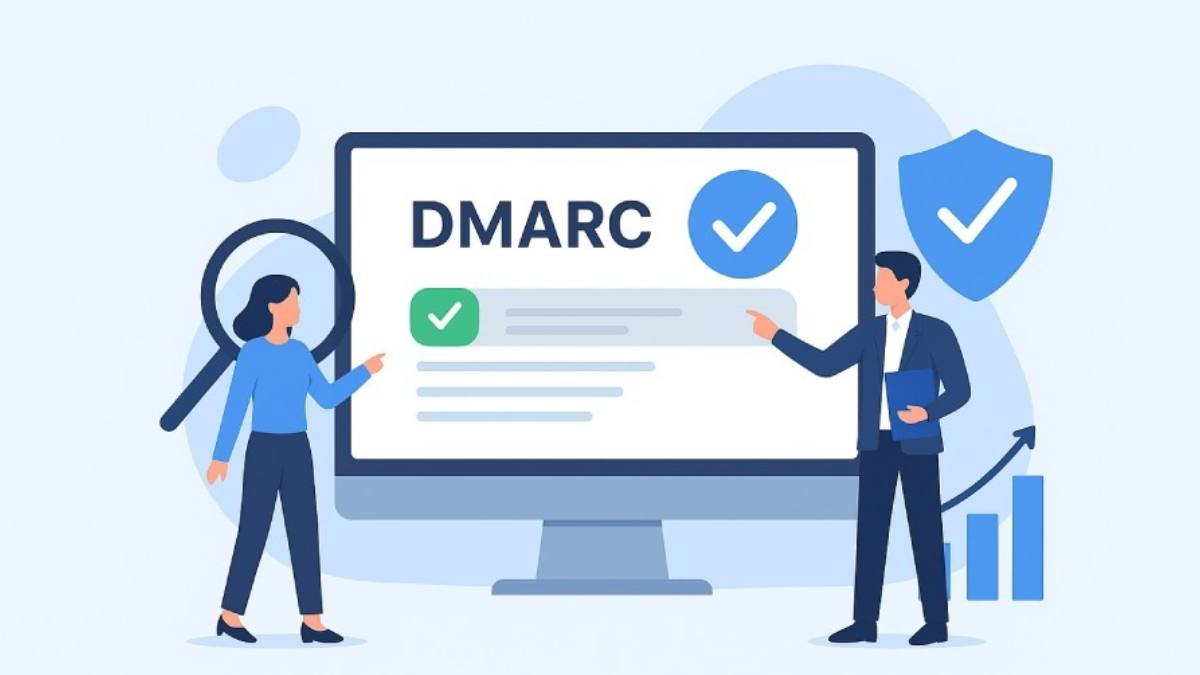Choosing the best DMARC lookup tools is essential for any organization that wants to secure its email domain and prevent cyberattacks like spoofing, phishing, and unauthorized email use. A DMARC lookup tool helps you instantly check and verify your DMARC records by fetching your live DNS TXT data and interpreting your domain’s policy with precision. Whether you’re enforcing a none, quarantine, or reject policy, these tools give you clear insights into your authentication setup and highlight critical issues that may affect security, compliance, or deliverability.
With email security standards tightening across major ISPs, having a trustworthy DMARC lookup tool is more important than ever. The right tool not only checks your DMARC record but also validates related protocols such as SPF and DKIM, ensuring full alignment and protection. By choosing reliable DMARC lookup solutions, organizations can quickly detect misconfigurations, improve policy enforcement, and strengthen their overall email ecosystem. In short, these tools provide the visibility and control you need to ensure your domain remains protected and your emails reach inboxes safely. You can start with the dmarcreport.com free tool.
Table of Contents
ToggleWhat is a DMARC Lookup Tool and Why is it Important?
A DMARC lookup tool is an essential resource for organizations looking to bolster their email security through robust email authentication protocols. In essence, a dmarc lookup tool is an online service that allows administrators to perform a dmarc check by querying a domain’s DMARC record—a specialized DNS TXT record that defines the domain’s DMARC policy. By instantly verifying and interpreting the DMARC record, these tools validate whether your domain is enforcing the correct policies and supporting technologies, such as SPF (Sender Policy Framework) and DKIM (DomainKeys Identified Mail).
This process is crucial for combating modern threats like phishing and spoofing protection, both of which are critical issues for enterprises, service providers, and even individual brands. A misconfigured or missing DMARC record can expose your organization’s communications to security vulnerabilities, impacting compliance with industry standards and risking potential reputation loss.
Additionally, top dmarc lookup tools facilitate seamless DMARC validation and reporting, making it easier to uncover syntax errors, misconfiguration, and alignment issues. Proper DMARC enforcement (adopting policies such as “quarantine” or “reject”) is an essential component for any domain seeking to meet the requirements set by ISPs like Google and Yahoo for trusted mail delivery.
Key Features to Look for in a DMARC Lookup Tool
Choosing the right dmarc lookup tool involves evaluating a wide range of email authentication and security features. Here are the essential capabilities you should expect from a best-in-class dmarc record checker:
Comprehensive DMARC Check and Validation
A reliable tool must perform a thorough dmarc check, validating the DMARC record syntax as outlined by RFC 7489. This includes confirming the presence and values of DMARC tags such as v (dmarc version), p (policy), rua (aggregate report URI), ruf (forensic report URI), pct (pct tag for policy enforcement percentage), adkim (DKIM alignment), and aspf (SPF alignment). Immediate detection of errors enables quick remediation, minimizing the window for misconfiguration and potential spoofing attempts
Real-Time DNS TXT Record Queries
A DMARC lookup tool should query the live DNS TXT record for a domain to provide accurate and up-to-date DMARC policy status. This ensures you can clearly see the intended policy and detect any issues. It also helps identify DNS propagation delays that may impact proper DMARC enforcement. Overall, it offers real-time visibility into your domain’s authentication setup.
Integrated SPF & DKIM Diagnostics
Top dmarc record checkers incorporate diagnostics for related authentication protocols—notably, SPF and DKIM. These protocols work in tandem with DMARC for domain authentication and must be correctly aligned (domain alignment) to meet the strictest security standards.
Policy Interpretation and Reporting Insights
A comprehensive dmarc lookup tool should explain the current residence of dmarc policy—be it none, quarantine, or reject policy. Additionally, advanced tools will preview the reporting endpoints (rua/ruf), show reporting interval, and clarify subdomain policy inheritance.
DMARC Reporting Support
Effective dmarc record checkers also preview DMARC reports settings. They should indicate whether aggregate report (rua) and forensic report (ruf) addresses are set, thereby verifying DMARC readiness for phishing protection and forensic feedback.
Historical Data and Misconfiguration Alerts
Professional-grade lookup tools often track historical DMARC changes, helping you understand how your records have evolved. They also highlight recurring misconfigurations that may need attention. This visibility provides valuable context for diagnosing issues. As a result, your security team can troubleshoot more effectively.
Top DMARC Lookup Tools: Detailed Comparison
Organizations worldwide rely on several free and commercial dmarc lookup tools and dmarc record checkers to monitor, validate, and manage their DMARC, SPF, and DKIM records. Let’s break down the best-in-class solutions and their unique features.
DMARCReport
DMARCReport is a robust DMARC lookup and reporting solution designed for businesses that need clear visibility into their email authentication performance. The platform not only checks DMARC records but also generates comprehensive aggregate reports that make it easy to monitor sending sources, detect unauthorized email activity, and diagnose authentication failures. DMARCReport focuses heavily on simplifying forensic and aggregate report analysis with data visualizations and meaningful insights.
Unique Features:
-
- Detailed analysis of DMARC, SPF, and DKIM alignment results
- Clean and visual dashboards for monitoring sending sources and authentication trends
- Fast detection of policy misconfigurations and deliverability issues
- Automated alerts and recommendations for improving compliance and moving toward stricter enforcement policies
EasyDMARC
EasyDMARC is renowned for its powerful dmarc lookup tool and intuitive interface. The tool performs instant DMARC checks, displaying a comprehensive interpretation of every DMARC tag—covering policy, rua/ruf, adkim, aspf, pct, subdomain policy, and more. EasyDMARC automatically checks the referenced SPF and DKIM records for domain alignment and authentication status, providing actionable suggestions to improve compliance and reduce the risk of spoofing.
Unique Features:
- Syntax validation with real-time DNS TXT record fetch
- Integrated guidance for DMARC enforcement upgrades (from none policy to reject policy)
- Visual reporting of aggregate and forensic report settings
MXToolbox DMARC Lookup
MXToolbox offers a feature-rich dmarc record checker widely used for troubleshooting email authentication. The MXToolbox provides detailed syntax analysis, flags invalid DMARC configurations, and includes basic support for associated SPF and DKIM checks.

Unique Features:
- Clear alerting for missing or expired DMARC records
- Visual breakdown of each DMARC tag
- Bulk lookup and customizable monitoring for multiple domains
dmarcian DMARC Inspector
dmarcian specializes in deep DMARC record analysis and compliance monitoring. Its DMARC Inspector tool translates complex record syntax into actionable intelligence, assesses risks, and simulates policy effects on outgoing email traffic. Dmarcian also provides reporting and compliance dashboards that track DMARC deployment and performance over time.
Unique Features:
- Simulated enforcement to preview the effect of current dmarc policy
- In-line guidance on policy upgrades and domain alignment
- Direct links to best practice documentation
Additional Mention: DMARC Record Checker
Services like DMARC Record Checker automate the DMARC check process by quickly identifying incomplete, expired, or misconfigured records. They streamline the validation process to ensure no critical issues go unnoticed. These tools are designed for fast detection of problems and immediate guidance on fixes. Their primary goal is rapid issue identification and effective remediation.
How to Use a DMARC Lookup Tool: Step-by-Step Guide
DMARC lookup tools are engineered to be user-friendly, but following a methodical approach ensures thorough dmarc validation and actionable insights.
Step 1: Identify Your Primary Domain & Subdomains
Begin by listing the main domain and any relevant subdomains you need to analyze, especially those used for sending outgoing emails. Include domains managed by third-party Email Service Providers or MSPs as well. This ensures you review every source involved in email delivery. Doing so helps you get a complete picture of your domain’s authentication setup.
Step 2: Enter Domain in DMARC Lookup Tool
Navigate to your preferred DMARC record checker, such as EasyDMARC, MXToolbox, or dmarcian’s DMARC Inspector. Enter your domain name into the tool to begin the lookup. If the tool requests additional details, provide any relevant subdomains as well. This ensures a complete and accurate DMARC analysis.
Step 3: Review the DMARC Record Details
The tool will query the DNS TXT record (_dmarc.yourdomain.com) and present the parsed dmarc record. Carefully examine key DMARC tags:
- v=DMARC1 (dmarc version)
- p=reject/quarantine/none (dmarc policy level)
- rua, ruf (reporting URIs for aggregate and forensic reports)
- adkim, aspf (alignment modes for DKIM and SPF)
- pct (percentage of emails subject to DMARC policy)
- sp (subdomain policy)
Step 4: Analyze Associated Authentication Protocols
Verify your SPF and DKIM records to ensure they align properly with your DMARC policy. Both protocols must match your domain setup for authentication to work correctly. Having full control over SPF and maintaining a valid DKIM signature are crucial steps. These elements together ensure complete DMARC compliance.
Step 5: Interpret Results and Take Action
Determine whether you’re running a none policy (monitoring only), quarantine (suspicious emails held), or reject policy (unqualified emails denied). Ensure reporting endpoints (rua/ruf) are active and secure, and analyze whether current settings meet internal policies and external ISP requirements.

Tips for Troubleshooting and Interpreting DMARC Lookup Results
A dmarc lookup tool can return a wealth of technical data, so successful DMARC validation requires careful interpretation:
Common Issues and Their Resolutions
Policy Misconfiguration
- None Policy: Provides reporting only—upgrade to quarantine or reject policy for real spoofing protection.
- Improper pct Tag: A low percentage means limited enforcement; increase as your domain’s compliance improves.
- Subdomain Policy: Ensure sp tag covers relevant subdomains in line with your risk posture.
Alignment and Authentication Failures
- DKIM/SPF Alignment: Use adkim/aspf tags in strict (s) or relaxed (r) mode for better domain alignment. Misaligned policies leave gaps in protection.
- Missing RUA/RUF: Without correct rua and ruf reporting URIs, you lose visibility into attack attempts or misused domains.
- Syntax Errors: Even an extraneous space in your DNS TXT record can invalidate the DMARC policy.
Advanced Troubleshooting Strategies
- Leverage both aggregate and forensic DMARC reports to understand the source of delivery failures and attempted spoofing incidents.
- Audit reporting intervals and investigate unexpected spikes in reports, which may signal new phishing or spoofing attempts.
- Monitor for updates in RFC guidelines, as authentication protocol enhancements—like upcoming changes from Internet Service Providers or industry leaders—will impact DMARC record requirements and reporting.
By leveraging the full capabilities of a robust dmarc lookup tool and diligently monitoring your DMARC records, organizations can ensure their email authentication protocols align closely with best practices, safeguarding users and brands from sophisticated email threats.
Also Read: What Makes Data Center Solutions Scalable, Secure, and Future-ready?
Shashi Teja
Related posts
Hot Topics
7 Common Mistakes Investors avoid with an FD Calculator
Investing in Fixed Deposits (FDs) may seem like a simple and safe way to grow your savings, but many investors…
How Custom Software Development Helps Businesses Scale Faster and Smarter
In the modern competitive digital economy, companies can no longer afford to depend on generic tools or a one-size-fits-all technology…



